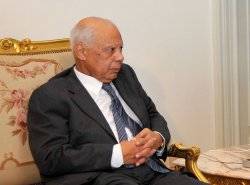Egypt's interim president has sworn in the first Cabinet since the military ousted the democratically elected president, giving members of the country's liberal movements key positions. The Cabinet includes three women.
The new government is led by Prime Minister Hazem el-Beblawi, an economist. Army chief Gen Abdel-Fattah el-Sissi, who ousted president Mohammed Morsi on July 3, retains his post as defense minister and also took the position of first deputy prime minister, an additional title given to defense ministers in the past.
The Morsi-appointed interior minister, Mohammed Ibrahim, remains in his post, in charge of the police. Nabil Fahmy, who was Egypt's ambassador to the US from 1999-2008, became foreign minister on Tuesday.
Underlining the relatively liberal outlook of the new government, President Adly Mansour named three women in his Cabinet, taking the powerful ministries of information and health as well as the environment ministry.
The Cabinet has 34 members, not including el-Beblawi.
Most past governments for decades have had at most two women in them.
The Cabinet does not include any figures from Islamist parties. The interim president's spokesman had said posts would be offered to the Muslim Brotherhood.
Although the group says it was never offered any posts, it also said that even if it had been invited to join the cabinet, it would have refused to participate in the military-backed political process and vowed to continue its protests.
Morsi's supporters accuse the military of carrying out a coup that has destroyed Egypt's democracy.
The Muslim Brotherhood immediately denounced the new cabinet.
"It's an illegitimate government, an illegitimate prime minister, an illegitimate cabinet. We don't recognize anyone in it," said Brotherhood spokesman Gehad El-Haddad.
"We don't even recognize their authority as representatives of the government."
On Monday, seven people died and hundreds more were injured as police fought running battles overnight with supporters of Morsi.
Egypt's state news agency said 17 policemen were injured in the violence, and 401 people have been arrested in relation to the clashes.
Hundreds of thousands of Morsi supporters were protesting to press their demands that he be reinstated as president, because, they say, he was removed by a military coup that overturned democratic rule.
Military urged to avoid 'political' arrests
The unrest came just hours after Under Secretary of State Bill Burns - the most senior US official to visit since the army toppled the elected Islamist president - appealed for an end to the violence rocking the Arab world's most populous nation.
Presidential spokesman Ahmed al-Muslimani urged all of Egypt's political forces, including Morsi's Muslim Brotherhood, to take part in national reconciliation efforts.
His comments echoed calls by the US envoy a day earlier for dialogue to replace the violence.
"The first priority must be to end violence and incitement, prevent retribution, and begin a serious and substantive dialogue among all sides and all political parties," Burns said after meeting al-Sisi and the military-backed interim leaders.
He also urged the military to avoid "politically motivated arrests" amid growing international unease at the crackdown on the Brotherhood.
A US State Department spokeswoman confirmed Burns had not met any Brotherhood officials during his two-day visit.
The US envoy was also snubbed by the grassroots Tamarod movement which organized the mass protests against Morsi that led up to the coup, "because the United States did not stand with the Egyptian people from the beginning," an official from the group told the AFP news agency.
Burns declined to comment on Morsi's continued detention.
Washington has refrained from saying Morsi was the victim of a coup, which would legally require a freeze on some $1.5bn in US military and economic assistance to Cairo. AL Jazeera's Nicole Johnston, reporting from Cairo, said that riot police were involved in the clashes, while the military stood on the sidelines.
Last week, 53 pro-Morsi demonstrators were killed outside the Republican Guard compound in Cairo. Four soldiers also died in the clash.
PHOTO CAPTION
In this image released by the Egyptian Presidency, Hazem el-Beblawi meets with interim President Adly Mansour, unseen, in Cairo, Egypt, Tuesday, July 9, 2013.
Aljazeera


 Home
Home Discover Islam
Discover Islam Quran Recitations
Quran Recitations Lectures
Lectures
 Fatwa
Fatwa Articles
Articles Fiqh
Fiqh E-Books
E-Books Boys & Girls
Boys & Girls  Articles
Articles










